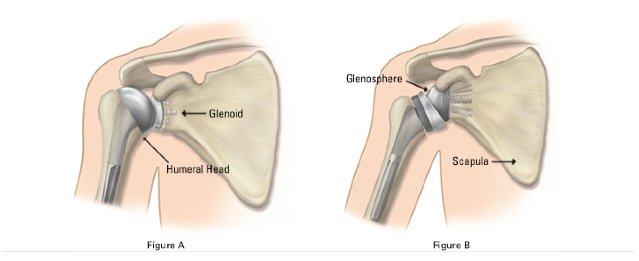Total Shoulder Replacement
As people live longer and seek to maintain active lifestyles, shoulder replacement surgery has grown substantially, with approximately 100,000 shoulder replacements performed in the United States a year. That number is growing higher annually.
You may have shoulder arthritis if you experience any of the following symptoms:
- Pain around the shoulder
- Limited mobility
- Sleep disturbance
- Weakness
- Catching or grinding with attempted motion of the shoulder
- History of rotator cuff tear
- History of shoulder fracture or dislocation
- History of shoulder surgery
Common Reasons for Shoulder Replacement Surgery
Osteoarthritis
Osteoarthritis (degenerative arthritis), the most common form of arthritis, affects nearly 21 million people in the United States. It is defined by degradation of the cartilage that lines the joint (“wear and tear”). Age, genetics, activity level, occupation, and co-existing medical conditions play a role in the development of osteoarthritis. As the cartilage continues to wear down, the joint becomes inflamed. This can result in severe pain, limited mobility and strength, and sleep disruption. If non-surgical treatment options such as medication, physical therapy, dietary and lifestyle changes fail to provide relief, Dr. Diaz may recommend total shoulder replacement.
Rotator Cuff Deficiency and Cuff Tear Arthritis
Because the shoulder joint is stabilized by muscles and tendons rather than by bone, the shoulder has great flexibility, allowing us to position our hand in the space around us with great freedom. However, this great degree of motion has a trade off, as the stability of the shoulder is dependent upon the integrity of the four muscle-tendon units (supraspinatus, infraspinatus, teres minor and subscapularis) that comprise the rotator cuff. Most people with a painful rotator cuff tear can be treated arthroscopically. Chronic, massive tears of the rotator cuff are often irreparable and can result in cuff tear arthritis of the shoulder. The degenerated muscles lose their ability to keep the humerus centered on the glenoid, causing your arm bone to move upward and out of the socket. This prevents you from positioning your hand in certain ways that can affect reaching overhead, dressing, playing sports, turning a steering wheel, eating, etc. Cuff tear arthritis is often characterized by severe pain and limited mobility of the shoulder, and in most patients is reliably treated with reverse shoulder replacement.
Other causes: Complex Fractures of the Shoulder, Post-Traumatic Arthritis, and Rheumatoid Arthritis
Other reasons for shoulder replacement include severe fractures of the upper arm, traumatic arthritis resulting from multiple dislocations or prior injury, or autoimmune conditions that affect the joints such as rheumatoid arthritis.
Types of Shoulder Replacement
Anatomic Total Shoulder Replacement
Shoulder replacement surgery replaces the damaged part of your shoulder to recreate the natural contours of the bones in a healthy shoulder. During surgery, Dr. Diaz will remove the damaged bone and cartilage. She will replace them with new surfaces to allow for a pain-free range of motion. In the treatment of osteoarthritis with good rotator cuff function, the ball resembles the native ball in shape and is made of metal, and the socket is made of a medical-grade plastic (polyethylene). This is called anatomic total shoulder replacement
Reverse Total Shoulder Replacement
If you are a candidate for surgery and you have pain and dysfunction from a massive, irreparable rotator cuff tear and/or arthritis, Dr. Diaz may recommend a reverse shoulder replacement. In this procedure, the anatomy of the shoulder is reversed by attaching a metal ball (glenosphere) to the glenoid and the plastic socket (humeral liner) to the upper humerus. If you are having a reverse shoulder replacement, the system will help restore pain-free shoulder function by empowering the triangular muscle on the outside of your shoulder, called the deltoid, to become the main functioning muscle in the absence of a healthy rotator cuff.

The Right Choice For You
Dr. Diaz will consider a number of factors when selecting the shoulder implant that is right for you. Your age, the status of your rotator cuff, your activity level, and your general health are among the most important variables.
If you are scheduled for shoulder replacement surgery with Dr. Diaz, please review:
Alternatives to Shoulder Replacement Surgery
Patients seeking an alternative to surgical treatment for early to mid stages of arthritis or certain joint or soft tissue injuries may be candidates for PRP therapy. Many patients who are considering biologics therapy are deciding between it and surgery. PRP therapy is minimally invasive and relatively low risk compared to surgery, making it an attractive option to many patients, but not everyone is a candidate for PRP therapy.

